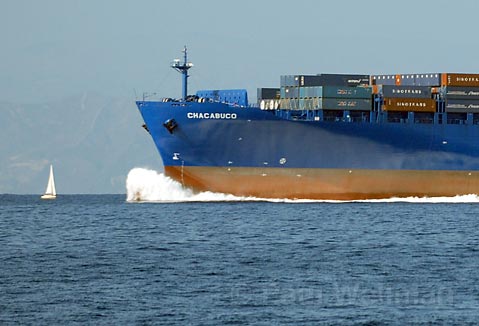Battling for the Blues
Enviros File Lawsuit to Protect Whales from Ships in Santa Barbara Channel and Beyond

Eleven years have passed since a plan was approved to help endangered blue whale populations recover, yet the federal agency in charge of enforcing the recovery effort is failing to take the mandatory steps to save the world’s largest animal from extinction. So this week, the Santa Barbara-based Environmental Defense Center (EDC) notified the National Marine Fisheries Service (NMFS) of its intent to sue the agency for violating the Endangered Species Act by failing to implement the recovery plan. Complaining that the plan has been “sitting on NMFS’s shelves gathering dust,” EDC attorney Brian Segee stated, “It is imperative that NMFS act immediately to effectively and aggressively address all threats to blue whale populations as required by the blue whale recovery plan.”
The planet’s blue whales were nearly obliterated by modern whaling during the 20th century. That practice was stopped by a worldwide hunting ban in 1966, and the species was added to the United States’ endangered species list when the Endangered Species Act passed in 1973. But many hazards still exist, including entanglements with fishing gear, toxins and trash in the water, and, most significantly, large ships. Today, the Santa Barbara Channel is “the surest place to see [blue whales] on the planet,” claimed Segee, boasting the channel has the “densest seasonal congregation in the summertime.” But it’s also a popular shipping lane, making the channel the “epicenter” for ships hitting blue whales.
Just two years ago, five whales died as a result of ship strikes in the Santa Barbara Channel. “We were hoping NMFS would use those tragic events to redouble its efforts,” said Segee, but he lamented that even those deaths were not enough to overcome the “bureaucratic inertia” that he labels the biggest hurdle to enforcing the plan. The EDC hopes that the notice of intent to sue will convince NMFS to take action, said Segee, who would prefer that court intervention not be necessary.
As of press deadline on Wednesday, no members of NMFS were able to comment on the EDC’s notice of intention to sue issued earlier that morning. Similar attempts to contact representatives in the shipping industry also garnered no replies. But Linda Krop, EDC’s chief counsel, explained that in the past, shipping representatives have been “pretty open” to their suggestions in hopes of protecting the whales. She said they’ve responded positively to requests for caution and reduced speed, but “for whatever reason, it’s not working.” Krop suggested complications may arise from the strict schedules these vessels keep, which make slowing down for whales less of a priority than arriving to port on time.
Whether the EDC’s lawsuit will help the whale is another question. “While the blue whale is endangered, the population is recovering,” explained Michelle Berman, the associate curator of vertebrate zoology at the Santa Barbara Museum of Natural History. Berman said that five deaths wouldn’t decimate the blue whale population as it would the endangered right whale, whose population currently stands at a mere 500. Berman said 2007 was an anomalous year. “We haven’t seen anything like it previously and haven’t seen anything like it since.” Furthermore, Berman believes that the whales “didn’t die in vain,” explaining that important information was gathered while examining the five dead whales. Berman thought the NMFS seemed to be “handling the issue delicately” in the myriad issues it deals with, and that the agency likely doesn’t have the “thousands or millions to spend” on implementing the blue whale plan.
But according to the EDC, NMFS has failed to move forward with some very basic steps, such as the appointment of an implementation coordinator and the establishment of a recovery goal. On top of that, the EDC is arguing that NMFS is not applying proven methods to reduce ship strikes and is not studying the ocean pollution levels that might be affecting blue whale habitat. In any case, NMFS now has 60 days to start implementing the blue whale recovery plan before the EDC can officially file a lawsuit that, if successful, could lead to a court requiring NMFS to comply.



